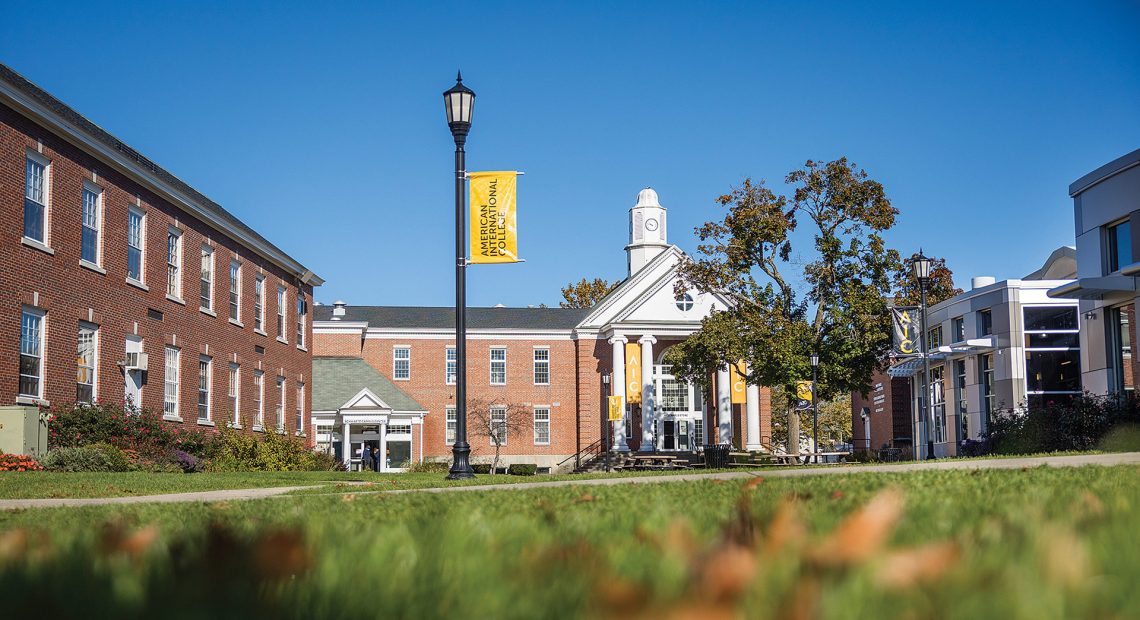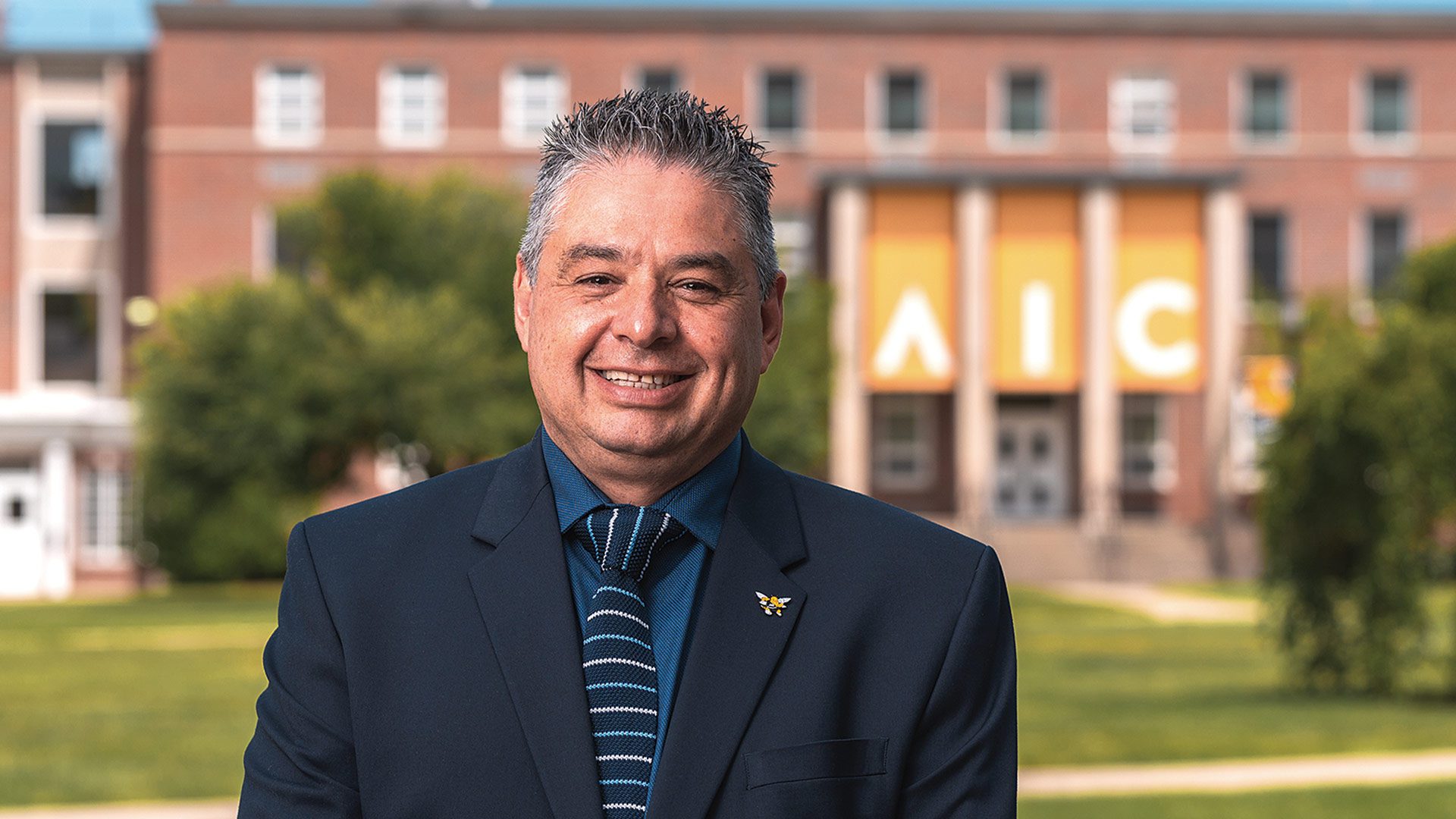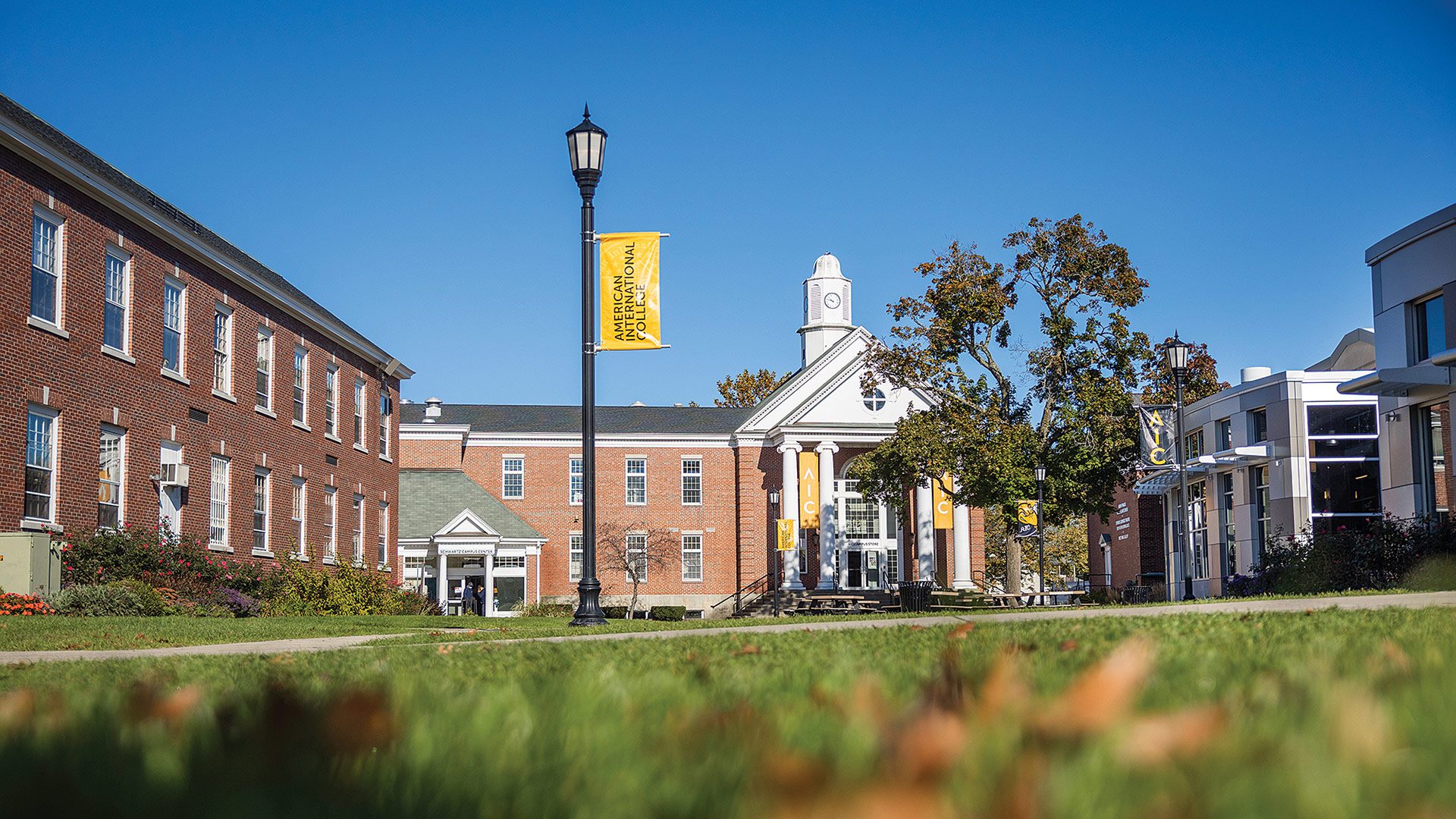
American International College Aims to Stem Region’s Talent Drain
Local Connections
Editor’s note: This article is the first installment of a new, monthly series on professional-development efforts at area colleges and universities. It’s as broad a topic as it sounds, and the higher-education community has certainly developed myriad strategies to help businesses find talent while helping area professionals access career ladders to advancement — and will share, during this series, the many ways they’re doing just that. Our first visit is to American International College in Springfield.

Hubert Benitez says it’s critical that colleges understand what businesses need in terms of worker skills and competencies.
At a time when employers in most sectors are struggling to attract and retain a workforce, leveraging the impact of the region’s colleges and universities is more important than ever.
That’s part of what Hubert Benitez, president of American International College (AIC), conveyed during an address to a recent Rise and Shine Business Breakfast sponsored by the Springfield Regional Chamber.
He highlighted that AIC graduates, coming from diverse backgrounds and primarily from the local area, make significant contributions to the economic development of the region — and that retaining talent within the community is key to enriching the social fabric of Greater Springfield and the surrounding region.
“Let’s explore how we can come together and join forces to serve the best interests of Springfield and Western Mass.,” he said. “That is the focus of our work at AIC.”
The intriguing part is how the college intends to boost workforce development and the regional economy — and it involves robust connections and communication with area businesses, in a number of sectors, to determine what they need, and what higher-education leaders can do to meet those needs.
“It’s critically important,” Benitez told BusinessWest shortly after that event. “Workforce development is one of the major focus areas of our education.”
Take, for instance, healthcare, one of this region’s key economic drivers — and, in particular, the persistent need for talented nurses.
“What we need is the employers to truly look at the academic institutions as their partners in this, because we need to be sitting at the table to hear what their needs are specifically.”
“There is no state that is not hurting for a nursing workforce,” Benitez said. “So our approach has been, let’s work together with the major industries in the region; how can we help provide that workforce? And it has to be a joint effort.”
That’s because students who study at area colleges must have a reason to stay here after they graduate. When they leave, he noted, AIC has done its job providing them with an education, but it has not fulfilled its mission to meet the workforce needs of Western Mass. or the Commonwealth at large.
“So we have to create an environment where the student understands that, if they pursue their nursing degree at AIC, they have a clear transition plan to the workforce at one of the major hospitals or hospital systems in the region.”
To that end, AIC has worked closely with Baystate Medical Center and the Trinity Health system to create models to fulfill their specific workforce needs. Benitez and his chief of staff have participated in strategic-planning sessions for workforce development at Baystate, and have also spoken with the leadership of Mercy Medical Center about creating a model to draw more advanced-practice providers to the hospital and the Trinity system.
“We heard firsthand, ‘we need more of this, more of this, and more of this,’” he said. “We have to be working together. If I don’t know — if the academic institution does not know — what they need, and what are the skillsets they’re looking for, there is no way the academic institution is going to be able to fulfill those needs.”
Not only does a college need to understand the needs of industries into which its graduates will enter, he explained, but it must to be nimble and willing to move in the direction of creating or reformatting initiatives that will fulfill these specific needs.

AIC is taking steps to better integrate career preparation into its programs.
“How education has been delivered in the past may not be what employers are looking for,” Benitez told BusinessWest. “That may take form of certificates, certifications, short courses of instruction, staff development. Some may say, ‘well, we really don’t need more of these at the baccalaureate level, but what about a certification with this specific skillset?’ We are looking to fulfill that.
“What we need is the employers to truly look at the academic institutions as their partners in this, because we need to be sitting at the table to hear what their needs are specifically. It’s that close working relationship that I would say is critically important,” he went on, adding that keeping young professionals local is a two-way street, an effort in which businesses must be engaged as well.
“Why should a graduate stay here in Western Mass.? That’s more on the employer side of things. How do they engage the graduate, entice the graduate to stay local and not go elsewhere? That goes beyond pay; that goes beyond benefits. It’s more, how do we make them feel that they have a good career trajectory here at Western Mass.? That’s part of what the employer has to look at as well.”
Partnering for Progress
Benitez stressed that four-year colleges like AIC aren’t the only important players in cultivating a local economy with plenty of young talent.
“As you look around and you read in the press, ‘we need more nurses, we need more physical therapists, we need more of this, we need more of that,’ well, some of those professions and careers are created at the community-college level. I am a full supporter of the community-college enterprise.”
Indeed, he explained, AIC has partnered with Springfield Technical Community College and Holyoke Community College on housing agreements, whereby students who attend community college can live at AIC and use its services. “That’s how much we value the relationship between AIC and the community colleges.”
Workforce-development efforts begin even earlier than that, however — with efforts at the high-school and even middle-school level to instill in young people an interest in careers where opportunities abound.
One example is working with middle- and high-school students to entice them to explore careers in STEM (science, technology, engineering, and mathematics) fields, Benitez noted. “It’s a two-pronged, even three-pronged approach: we’re working with vocational schools, technical schools, community colleges, and the public school systems because we know that’s where the appreciation for the skillset begins. We’ve got to grab the kids really, really early. And we’re working toward that goal.”
One new partnership between AIC and two community groups — the Coalition of Experienced Black Educators and the Springfield Empowerment Zone Partnership — promotes access to higher education by empowering parents to support their children’s academic success, which, in turn, will benefit the region’s economy if those young people earn degrees and stay local.
“How do they engage the graduate, entice the graduate to stay local and not go elsewhere? That goes beyond pay; that goes beyond benefits. It’s more, how do we make them feel that they have a good career trajectory here at Western Mass.?”
Another new new initiative aims to strengthen AIC’s commitment to equipping students with the necessary skills and knowledge for successful careers. The college is among 10 member institutions to benefit from a three-year, $2.5 million grant awarded to the Yes We Must Coalition (YWMC) by Ascendium Education Group to integrate career preparation into four-year degree programs.
This grant — titled “Addressing Inequity in College Retention of Low-income Students: Collaboratively Creating Pathways to Careers in Four-year Degree Programs” — will provide AIC with resources to implement new strategies to promote career readiness. The award will support a partnership among AIC, Jobs for the Future, and Sova Solutions to ensure that students from all backgrounds have equal opportunities to succeed in their chosen fields.
More effectively integrating career preparation into AIC’s four-year degree programs is a step that recognizes the evolving demands of the employment market, Benitez noted. By aligning academic coursework with real-world skills, students will be better equipped to navigate their future careers upon graduation. The degree programs slated for redesign include psychology, biology, business, sociology, theater, and criminal justice.
A New Mindset
To Benitez’s original point however, for any college to adequately meet the needs of the regional economy — and adequately prepare its graduates to succeed within it — it must first know what those needs are.
“I’m telling my industry colleagues and the business colleagues, ‘what do you need as it relates to the workforce? Maybe we can deliver that for you.’ I’m not going to my colleagues and saying, ‘look, AIC is asking for this, this, and this.’ No, on the contrary, I’m saying, ‘what do you need? Let me know because I think I can deliver that for you.’”
In his remarks at the chamber breakfast, he emphasized the importance of collaboration and working toward a greater good in the realm of higher education. “This area is blessed with having so many institutions of higher learning. But it’s not about competition; it’s about working together for the common good.”
To that end, he noted that, in his first year since becoming president, AIC has actively engaged with scores of individuals and community leaders, seeking opportunities for collaboration. “We want to be invitational to the community, not asking for anything, but to ask them, ‘how can we work together?’”
This focus outside the campus, on how AIC can be a catalyst for a stronger regional economy, is part of what Benitez means when he says he wants to reimagine a college education.
“We continue doing that every single day — reimagining how we deliver education, the cost of education, reimagining the sense of belonging in an educational enterprise, but also how we teach students,” he told BusinessWest. “Students today come to academic institutions with a completely different mindset. They think differently about the world. They think differently about the profession. Some of them even question the value of an education.
“That is our reality,” he went on. “So how we deliver education, how we communicate with them, has drastically changed. We think about reimagination every single day.”




